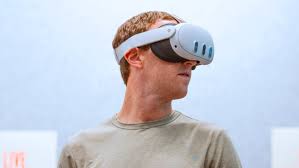Mark Zuckerberg, the CEO of Meta, formerly known as Facebook, took the stage at the company’s Connect developer conference to unveil their latest developments in virtual and augmented reality (VR/AR) and artificial intelligence (AI). The conference kicked off with the announcement of the next iteration of Meta’s virtual reality headset, the Quest 3, which will retail for $499 and start shipping on October 10th.
Zuckerberg highlighted Meta’s focus on building the future of human connection and envisioning a world where people interact with hologram versions of friends and coworkers, as well as AI bots designed to assist them. He introduced an AI personal assistant that can be accessed through any of Meta’s messaging apps, along with a range of AI characters like “Max the sous chef” and “Lily, a personal editor and writing partner.” These AI characters aim to make everyday tasks more seamless and enjoyable.
In addition to VR and AI, Zuckerberg also unveiled the next version of Meta’s smart glasses, called Ray-Ban Stories, which allow wearers to record videos and photos, livestream, listen to music, and interact with the Meta AI assistant. Zuckerberg emphasized that smart glasses are the optimal form factor for allowing AI assistants to see and hear what the wearer is experiencing.
Meta’s transformation from a provider of social platforms to a dominant force in the metaverse, a virtual reality world akin to the internet but in 3D, has been a significant undertaking. Although the process has been slower than expected and costly, Meta remains determined to make its mark in the nascent VR world.
One of the company’s biggest challenges is competing with TikTok, a popular social media platform that has gained significant traction among younger audiences. To address this challenge, Meta is focusing on ways to enhance user engagement through initiatives like chatbots and AI-driven personalization.
To support its long-term vision, Meta has been investing heavily in AI technology. Earlier this year, the company released Llama 2, the next generation of its AI language model, as a free resource for research and commercial use. At the Connect conference, Meta unveiled a new AI image generator named Emu, which generates images based on user prompts. These efforts reflect Meta’s commitment to advancing AI technology, even as it faces tough competition from other tech giants like Google and Microsoft in the generative AI space.
As Meta pursues its ambitious goals, it is also focusing on optimizing its workforce. With aims to increase efficiency, the company plans to reduce its workforce while making strategic hires in technical roles, specifically AI experts.
In conclusion, Meta’s Connect developer conference showcased the company’s latest developments in VR/AR and AI. With the introduction of the Quest 3 VR headset, AI personal assistants, smart glasses, and AI image generators, Meta is working towards creating a metaverse where humans can connect and interact in immersive and innovative ways. While challenges persist, Meta remains committed to its long-term vision and the transformative power of AI in shaping the future of human connection.





Use the share button below if you liked it.